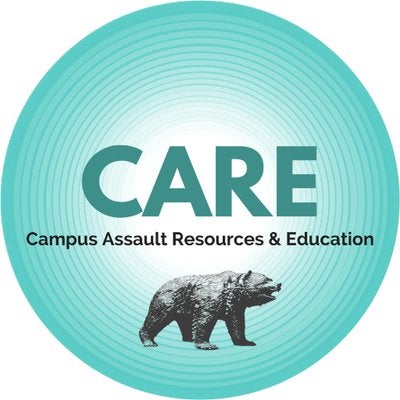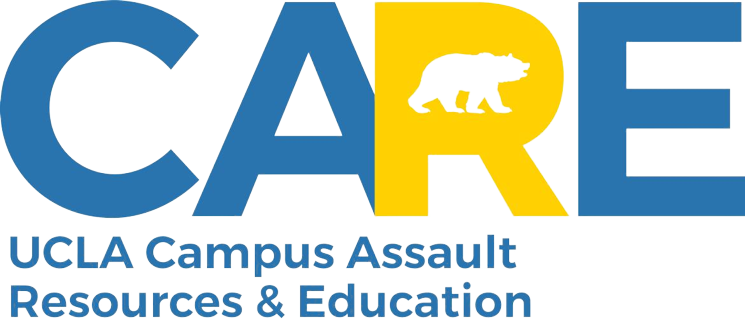Sex Week 2023
Sex Week @ UCLA is campus-wide initiative that focuses on love, healthy relationships, communication, sex, self-love, consent, abstinence, faith, and sex positivity.
In light of Sex Week, EDI and our campus partners wanted to provide the Bruin community with more information on valuable resources available at UCLA.
UCLA Campus Assault Resources & Education (CARE) Program
About Us
Campus Assault Resources & Education (CARE) operates from an anti-oppression framework and is committed to the eradication of sexual and gender-based violence through creating and sustaining a safe, healthy, equitable community for all people. CARE has three distinct, but complementary services: Education, Advocacy, and Healing. Combined, these three components allow us to address primary, secondary, and tertiary levels of prevention providing a comprehensive approach in service of our mission.
Advocacy: CARE Advocates offer confidential support and advocacy to UCLA affiliated undergraduates, graduate students, professional students, faculty, staff, and alumni. The primary role of the advocate is to provide emotional support and establish safety for all clients. We are not considered “Responsible Employees.”
Advocates can support with the following:
- Crisis intervention and emotional support
- Resources/referrals for counseling, medical, legal, and other resources as needed
- Developing a safety plan
- Addressing academic, housing, and employment concerns
- Navigating the criminal justice system, Title IX, and/or the Student Conduct Process
- Accompaniment to police, Title IX, and/or Student Conduct interviews, meetings, and hearings
- Obtaining a No Contact Directive/Stay Away Order from the Dean of Students
- Obtaining a Restraining Order
- Healing and Empowerment
Healing: Healing from trauma can be a long, difficult journey. The way we heal is greatly impacted by who we are as individuals, the identities we hold, our geographies, and our histories. Access to resources like therapy can be challenging for some and those people still deserve the opportunity to have space held for them and to experience community. With respect to the far-reaching complex impact of trauma, CARE is committed to offering alternative forms of healing for survivors including yoga, journaling, music, art, and dance.
Education: CARE provides comprehensive outreach and prevention education to the campus community on sexual assault, dating and domestic violence, and stalking. We can create custom workshops and presentations for your UCLA student group or department. We operate from an anti-oppression framework, and strive to create intersectional presentations that address the root causes of violence. Some topics include: an overview of CARE services, identity and oppression, the effects of trauma, alternative healing, dating and domestic violence, stalking, rights and resources, supporting survivors, bystander intervention, and rape culture.
Additional Resources
CARE offers a wide selection of resources including on-campus confidential resources, local/community resources, national resources, and brochures. To access and review available resources, please visit CARE’s Resource page: https://careprogram.ucla.edu/get-help/resources
Common Misconceptions About CARE
➡ Our work is about centering your voice, choices, and safety. Being able to meet you where you’re at, explore what feels right for you in your healing, support and process is the most important. Everyone’s journey with sexual and relationship violence is unique and shaped by your identity, histories and community. We are here to listen.
➡ We are not Title IX and we do not cross report to each other without the consent of the survivor.
➡ You do not need to have reported to Title IX, law enforcement, or anyone else to receive services with us.
Contact Information
To get in contact with us, please email us at care@careprogram.ucla.edu or call us at 310.206.2465.
Testimonials from the CARE Team




UCLA Title IX Office
About Us
At Title IX, we dedicate ourselves to aiding the University in providing an environment and experience free from all forms of discrimination and harassment based on sex, gender, gender identity, gender identity, sexual orientation, and pregnancy. To that end, we monitor conditions on campus, provide specialized trainings to students, faculty, and staff, and receive and address reports of discrimination, harassment, and sexual violence. In addressing reports of discrimination, harassment, and sexual violence, we act as neutrals to resolve matters through informal means, alternate resolution, or formal investigation. Our office is here to answer questions about Title IX compliance, to work with individuals and departments to educate them regarding their obligations under Title IX, and to address violations of Title IX.
Additional Resources
The Title IX provides the following resources:
- Title IX trainings, both generalized trainings to everyone on campus and targeted trainings to individuals, groups, and departments.
- Interim measures to provide for safety and facilitate participation in University programs.
- Informal resolutions with parties to resolve matters.
- Formal investigations to determine whether Title IX has been violated.
Common Misconceptions About the Title IX Office
➡ There is a misconception that Title IX does not apply to international students or undocumented students. In fact, Title IX applies to everyone affiliated with the University regardless of where they are from.
➡ There is a misconception that the Title IX Office advocates for particular outcomes in disciplinary proceedings. The Title IX Office is neutral, and is not on the side of either complainants or respondents. Both parties have equivalent rights throughout the process.
➡ There seems to be a misconception that men are always perpetrators of sexual harassment, sexual discrimination, or sexual violence, and women are always the victims. Anyone can engage in sexual harassment, sexual discrimination, or sexual violence, regardless of gender. Men, women, trans men, trans women, nonbinary people, and any other identity experience sexual harassment, sexual discrimination, and sexual violence, and people can be perpetrators of sexual harassment, sexual discrimination, or sexual violence regardless of gender identity or sexual orientation.








